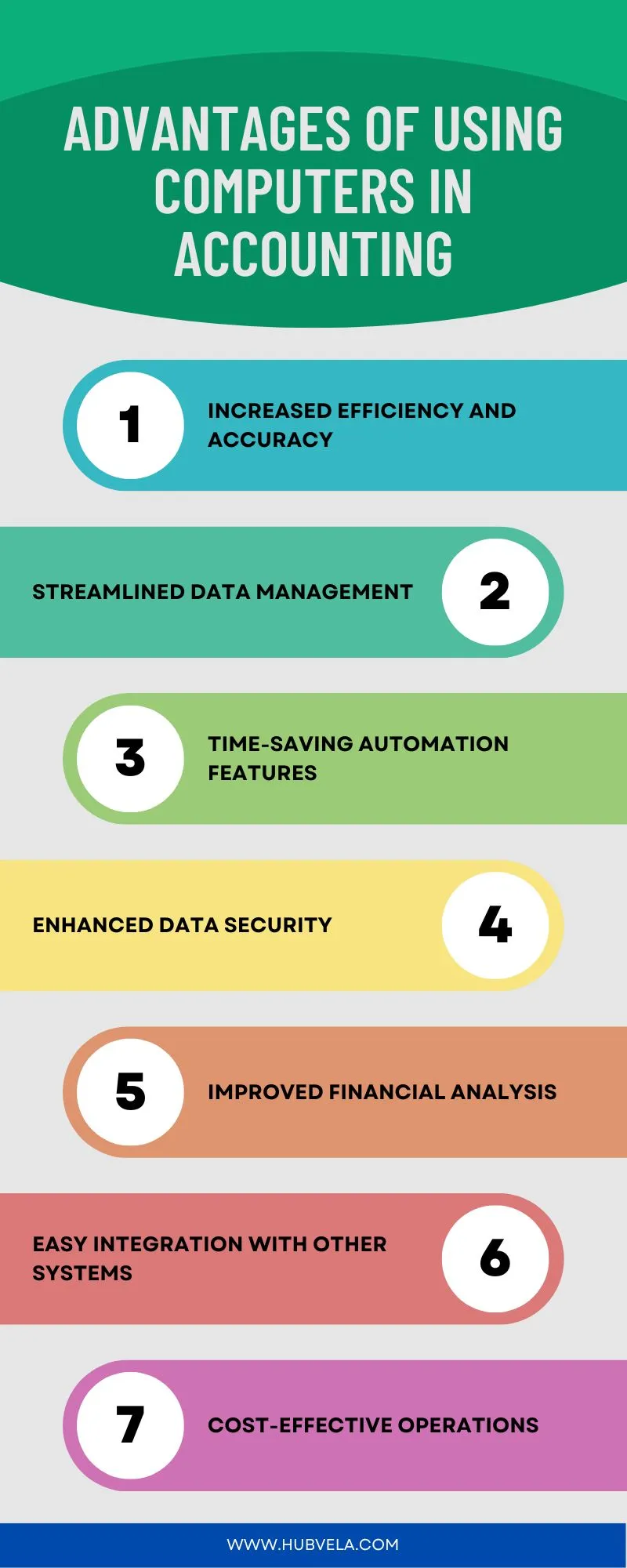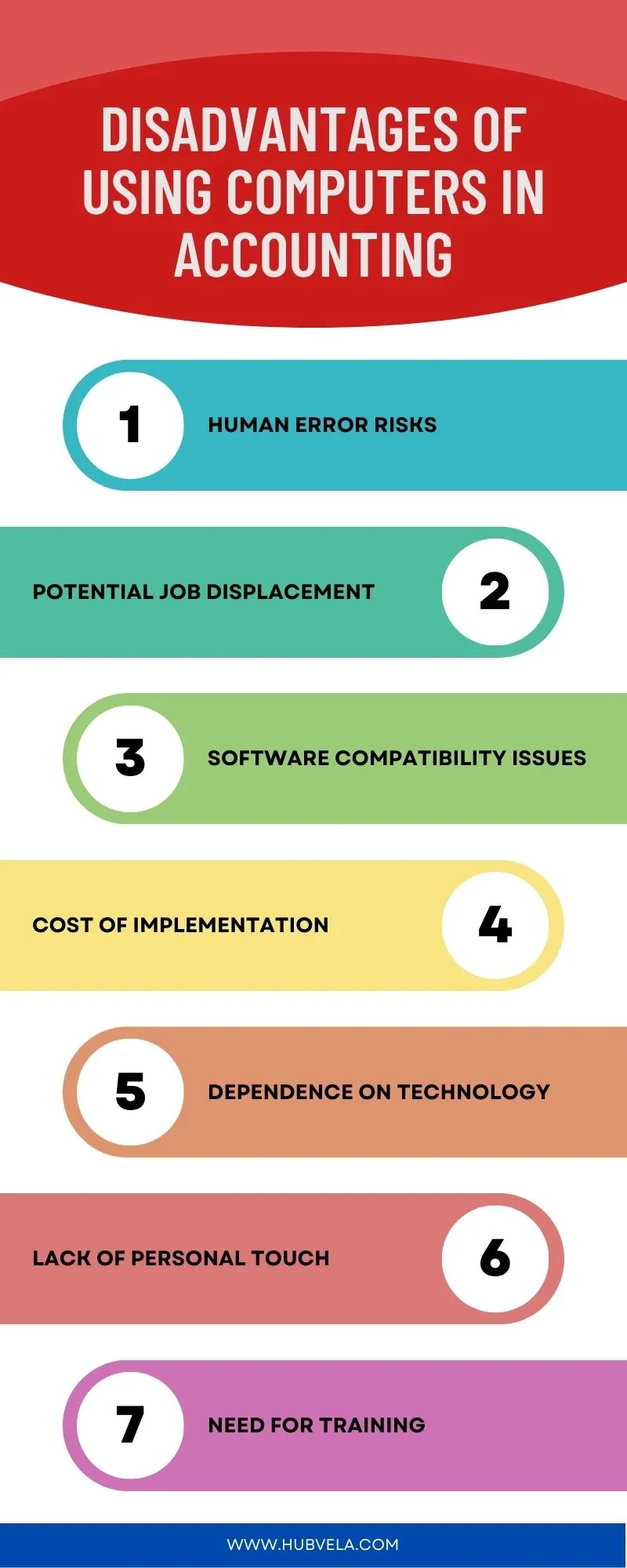The use of computers in accounting has become increasingly common, as accounting software programs offer numerous advantages and improvements over traditional manual accounting methods.
However, there are also some disadvantages to relying solely on computerized accounting systems.
In this article, we will discuss the advantages and disadvantages of using computers in accounting, as well as how to choose the right accounting software for your business.

--Advertisement--
Advantages of Using Computers in Accounting
The use of computers in accounting has revolutionized the way businesses manage their financial records and perform accounting tasks. Computerized accounting systems offer numerous advantages, including:

1. Increased Efficiency and Accuracy
With computers, you can significantly increase efficiency and accuracy in accounting. By automating various tasks, computers help to streamline processes and improve productivity. With increased productivity, you can handle more transactions and financial data in less time. This allows you to make more informed decisions as you have access to real-time financial information.
Computers also provide powerful data analysis capabilities, allowing you to analyze large amounts of data quickly and accurately. By reducing manual errors, computers eliminate the risk of human mistakes that often occur during manual calculations. Additionally, automated reporting features enable you to generate accurate financial reports effortlessly.
2. Streamlined Data Management
To streamline data management in accounting, computers offer a range of advantages that improve efficiency and organization.
One of the key benefits is improved data organization. Computers allow for the creation of digital databases and the ability to sort, search, and filter data with ease. This eliminates the need for manual filing systems and reduces the risk of misplaced or lost documents.
Additionally, computers enable efficient processes by automating repetitive tasks such as data entry and calculations. This saves time and allows accountants to focus on more complex and analytical tasks.
Improved productivity is another advantage of using computers in accounting. With access to software tools for data analysis and reporting, accountants can generate insights and make informed decisions more quickly.
Lastly, computers contribute to data integrity by providing security measures to protect sensitive financial information from unauthorized access or loss.
3. Time-Saving Automation Features
Take advantage of time-saving automation features in accounting by utilizing the capabilities of computers.
Automation benefits in accounting include improved time efficiency, task optimization, increased productivity, and reduced manual work.
With the help of computer software, repetitive and time-consuming tasks such as data entry, calculations, and report generation can be automated, saving valuable time that can be allocated to more strategic activities.
By automating these processes, the risk of errors and inaccuracies is also minimized, leading to more accurate financial records and reports.
Additionally, automation allows for seamless integration between different accounting systems and software, eliminating the need for manual data transfer and reducing the chances of data duplication or loss.
Embracing time-saving automation features in accounting can significantly enhance efficiency and productivity in your financial operations.
4. Enhanced Data Security
By utilizing the capabilities of computers, you can enhance data security in accounting.
One of the ways computers can enhance data security is through data encryption. With data encryption, sensitive financial information is converted into a code that can only be accessed with the correct decryption key.
Additionally, computers allow for easy and efficient data backup, ensuring that important financial data is protected in the event of hardware failure or data loss.
Access control is another important feature that computers provide. By setting up access controls, you can limit who’s access to sensitive financial information, reducing the risk of unauthorized access.
In the event of data loss or corruption, computers also facilitate data recovery, allowing you to restore lost or corrupted data quickly and easily.
Lastly, computers enable the implementation of various cybersecurity measures, such as firewalls and antivirus software, to detect and prevent cyber threats.
5. Improved Financial Analysis
You can achieve improved financial analysis by utilizing computers in accounting. One of the advantages of using computers in accounting is the ability to make better decisions based on accurate data.
With the help of data visualization tools and data analytics software, you can analyze financial information more effectively. These tools allow you to spot trends, patterns, and anomalies in the data, providing valuable insights for decision making.
Additionally, computers enable real-time reporting, which means you can access up-to-date financial information whenever you need it. This real-time reporting feature helps you make timely and informed decisions.
Furthermore, computers ensure data accuracy by automating calculations and reducing human errors.
6. Easy Integration With Other Systems
When incorporating computers into your accounting system, you can easily integrate them with other systems, allowing for seamless data transfer and improved efficiency.
The integration benefits of using computers in accounting are numerous. One major advantage is system compatibility, as computerized accounting systems can easily connect with other software applications used in different departments or functions of your organization. This allows for data synchronization and the ability to share information across departments in real-time.
Additionally, computers enable seamless connectivity between different platforms, whether it’s a desktop computer, laptop, or mobile device. This cross-platform functionality ensures that you can access and update your accounting information anytime, anywhere.
7. Cost-Effective Operations
Maximizing cost-effectiveness is achieved by utilizing computers in accounting, allowing for streamlined processes and increased efficiency.
One of the main advantages of using computers in accounting is the significant cost savings it can provide. By automating repetitive tasks and eliminating the need for manual data entry, businesses can save both time and money.
Additionally, computers enable improved decision making through data analysis. With the ability to quickly generate reports and analyze financial data, businesses can make informed decisions that can lead to increased profitability.
Another advantage is scalability. Computers allow accounting systems to easily accommodate the growing needs of a business, without the need for additional resources.
Lastly, computers help reduce errors by automating calculations and providing built-in checks and balances, ensuring accurate financial records.
Disadvantages of Using Computers in Accounting
Computerized accounting systems have become increasingly popular in recent years, offering numerous advantages such as simplicity, accuracy, and integration with other business systems.
However, there are also several disadvantages to using computers in accounting, which include:

1. Human Error Risks
Using computers in accounting presents the risk of human errors. While automation benefits the accounting process by minimizing manual tasks, it also introduces the possibility of data entry errors. Reliance on software can lead to mistakes if the software isn’t properly programmed or if the user lacks the necessary understanding of its functions.
Additionally, data privacy concerns may arise when sensitive financial information is stored and processed electronically. Human errors can occur when entering data, selecting the wrong options, or misinterpreting results. These errors can have significant consequences, such as inaccurate financial statements or incorrect calculations.
Therefore, it’s crucial for accountants to exercise caution and double-check their work when using computers in accounting to mitigate the risks associated with human errors.
2. Potential Job Displacement
To avoid potential job displacement, it’s important for accountants to adapt to the changing landscape of technology in accounting. While the automation benefits of using computers in accounting are evident, it’s crucial for accountants to enhance their employee skills to remain relevant in the job market.
Technological advancements have led to increased efficiency and accuracy in accounting processes, reducing the need for manual intervention. As a result, accountants may face challenges regarding job security. However, rather than fearing job displacement, accountants should embrace the opportunities that technology brings.
3. Software Compatibility Issues
You may encounter software compatibility issues when using computers in accounting. One of the main challenges is keeping up with software updates. Accounting software often requires regular updates to fix bugs, improve functionality, and ensure compatibility with other programs. If you fail to update the software regularly, it may lead to compatibility issues with other applications or even result in data corruption.
Another issue is data backup. It’s crucial to regularly backup your accounting data to prevent loss or corruption. However, different software may have different backup processes, making it difficult to maintain a consistent backup strategy.
Additionally, system requirements can be a challenge. Some accounting software may require specific hardware or operating systems that may not be compatible with your current setup.
Troubleshooting compatibility issues can also be time-consuming and frustrating. It may require contacting user support and waiting for their assistance, which can disrupt your accounting workflow.
4. Cost of Implementation
Implementing computers in accounting can incur significant costs.
The implementation cost includes expenses related to hardware requirements, such as purchasing computers, servers, and other necessary equipment.
Additionally, training expenses are incurred to ensure that the staff is proficient in using the accounting software effectively.
Software licensing fees also contribute to the overall cost, as specialized accounting software is often required.
Furthermore, maintenance costs should be considered, including regular updates, backups, and security measures to protect sensitive financial information.
These costs can add up, especially for small businesses with limited budgets.
It’s important to carefully evaluate the financial impact of implementing computerized accounting systems and weigh it against the potential benefits they offer.
5. Dependence on Technology
While the cost of implementing computers in accounting can be a significant disadvantage, another drawback is the potential dependence on technology.
One of the main concerns with relying heavily on technology is reduced productivity. If the system experiences technological glitches or downtime, it can greatly impact the efficiency and speed of accounting processes.
Additionally, overreliance on technology can lead to decreased job satisfaction among accountants. They may feel less engaged and challenged in their work, as automation takes over repetitive tasks.
Moreover, data security concerns arise when sensitive financial information is stored electronically. The risk of hacking and unauthorized access increases, making it essential to invest in robust security measures.
It’s important to strike a balance between the benefits of computerization and the potential drawbacks of dependence on technology.
6. Lack of Personal Touch
Despite the numerous advantages, one disadvantage of using computers in accounting is the lack of personal touch.
While computers have revolutionized the accounting industry, they can’t replace the value of personal interaction in building strong client relationships and providing exceptional customer service.
Unlike computers, humans have the ability to understand and respond to individual needs, offering customized solutions to meet specific requirements.
The human connection that comes with face-to-face communication is crucial in fostering trust and loyalty between accountants and their clients.
It allows for a deeper understanding of the client’s goals and challenges, leading to more effective problem-solving and decision-making.
Although computers have streamlined many accounting tasks, it’s important not to overlook the importance of human interaction in delivering exceptional service and building lasting client relationships.
7. Need for Training
To effectively utilize computers in accounting, you need to undergo training to overcome the disadvantages associated with their use.
The rapid advancement of technology in the accounting field necessitates continuous skill development to keep up with the changing landscape.
Training needs in accounting cover various aspects, such as understanding software functionalities, data security, and compliance regulations.
Educational programs and learning resources are available to help accountants enhance their proficiency in using accounting software and other computer-based tools.
These programs offer in-depth training on specific software applications, as well as broader courses on computerized accounting systems.
Engaging in professional development activities, such as attending workshops or webinars, can also contribute to improving your computer skills in accounting.
Conclusion on Advantages and Disadvantages of Using Computers in Accounting
In conclusion, the use of computers in accounting offers numerous advantages that can greatly benefit businesses.
Increased efficiency and accuracy, streamlined data management, time-saving automation features, enhanced data security, improved financial analysis, easy integration with other systems, and cost-effective operations are all significant benefits that can positively impact the accounting process.
However, it is important to acknowledge the potential disadvantages that come with relying on computers for accounting tasks.
Human error risks, potential job displacement, software compatibility issues, the cost of implementation, dependence on technology, lack of personal touch, and the need for training are all factors that should be carefully considered.
Ultimately, the decision to embrace computerized accounting systems should be made after weighing both the advantages and disadvantages.
Businesses must assess their specific needs, resources, and goals to determine if the benefits of using computers in accounting outweigh any potential drawbacks.
It is crucial to carefully plan and implement computerized systems, ensuring proper training and support are provided to mitigate risks and maximize the benefits.


